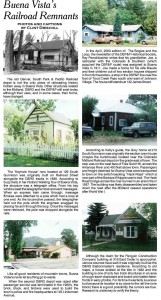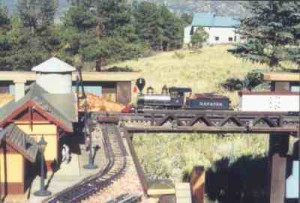Review by Ed Quillen
Books – January 2004 – Colorado Central Magazine
EVERY WINTER, Martha tells me it’s time to write a list of favorite books from the preceding year, and unlike most of our writings about books, these selections don’t have to concern Central Colorado.
I’ve found a few ways around this — one year, I wrote about newspapers and magazines — because what I read for pleasure is rather embarrassing to admit in public. My secret vice is the True Crime genré (it fits with my favorite TV show, Law & Order), and so if you looked at the paperbacks I accumulate, you’d be sure that my favorite authors were Ann Rule (The Stranger Beside Me), Joe McGinniss (Fatal Vision), and Jack Olsen (Doc: The Rape of the Town of Lovell).
As much as I enjoy those books and their relatives, though, I can’t really recommend them to anyone. If you like True Crime, you’ve doubtless read them or books like them, and if you don’t, what’s the point?
I don’t read a lot of fiction, but one memorable novel is Crazy Heart, by Tom Cobb. Martha found it somewhere at least a dozen years ago, read it, and pushed me to read it. After I did, I pushed it on everybody I knew.
It’s the tale of Otis “Bad” Blake, a busted-down old country-and-western singer. It starts at a bowling alley in Pueblo, where Blake has to ask his back-up band where he is, and heads south from there through the honkey-tonks and roadhouses of Colorado, New Mexico, Arizona, and finally, Texas.
Cobb has a fine eye for low-life detail, his dialogue sounds real while moving the story, and every musician who read the book told me that it’s an accurate description of the business. Plus, ol’ Bad Blake seems so real that I’m sure I’ll wander into the Vic some afternoon, and find him on a barstool next to me.
Like many fine books, Crazy Heart never got the attention it deserved, and it’s long out of print — although a web search showed that used copies are available.
But Cobb has a new book, Acts of Contrition, a collection of short stories published in 2003 by Texas Review Press. Some of them are set in Colorado, but all of them catch something of the gritty end of life that you don’t find in, say, Redbook or The New Yorker.
Not all of the stories are as straightforward as Crazy Heart — Cobb experiments with quick jumps in time and place — but they’re all engaging. My favorite was “I’ll Never Get Out of this World Alive,” where a junior-college English teacher takes up with Carol the barmaid, who “is a fine looking woman, and I have done a great deal of looking. She could be, if necessary, the Levi Strauss company’s main reason for existing.”
HE’S A FAN of John Keats, she of Hank Williams. Both poets died young, and the narrator starts conflating them: “By the time he was twenty-six, suffering from a lung condition and a bad back, John Keats began a steady abuse of alcohol and drugs. He soon developed a reputation for showing up at concert dates drunk, if he showed up at all…. Just two years later, in 1821, living on bourbon and seconals, John Keats went to sleep in the back of his famous white Cadillac and never woke up.”
What a great spin of the imagination. Cobb’s stuff can get addictive.
My other recent fiction trend started a few years ago, when Greg Truitt lent me a copy of The Killer Angels, by Michael Shaara. It’s a novel about the 1863 Battle of Gettysburg, told from the vantages of various military participants: Robert E. Lee, James Longstreet, George G. Meade, Joshua L. Chamberlain.
Like all good historical fiction, it follows the known history closely, while providing the internal musing and conversations that aren’t in history books. It gave me a much better feel for the ebb and flow of the bloodiest battle in American history.
Since it’s a novel, it can’t settle those old controversies about whether Longstreet displayed sufficient enthusiasm in finally obeying Lee’s order to have Pickett charge. But you can almost hear the muskets and smell the smoke, and you’ll revisit that and other controversies with a new grasp on the subject.
Michael Shaara died a few years ago, but his son Jeffrey picked up the family trade. He added two more Civil War novels — Gods and Generals and The Last Full Measure — as well as a novel of the Mexican War, Gone for Soldiers.
THEY MIGHT NOT BE quite as good as Killer Angels (what could be?), but they’re still great reading. Perhaps the world really doesn’t need any more Civil War books — there must be thousands — but that can’t be said of the Mexican War, which gets little attention from historians or novelists. That may explain why Gone for Soldiers was my favorite of the lot. We see future Civil War leaders like Lee and Ulysses S. Grant as young officers, not always sure of their profession. Like the others, it’s narrated from a variety of viewpoints, including Santa Ana’s.
Shaara has also written two novels of the Revolutionary War, Rise to Rebellion and The Glorious Cause. Given the author’s track record, I’m sure they’re agreeable, but they’ll have to wait until 2004 — because I haven’t read them yet.
Instead, I’ve been reading about the Founding Fathers. Walter Isaacson’s Benjamin Franklin: An American Life covers just about everything in a lively way. It doesn’t skip Franklin’s many vices, but neither does it ignore his considerable accomplishments as a scientist, writer, diplomat, and political philosopher. You come away wishing you could have dinner with the witty and charming Franklin, which, of course, is impossible. But this biography is the next best thing.
One often-minimized factor in American history is the “3/5 clause” in the original federal constitution. Every five slaves in a state were counted as three residents for the purpose of congressional apportionment. Thus the southern states had more representatives in Congress — and more presidential electors — than their free population would have justified.
You’re right; anything this weird would have to be the result of a political compromise. This compromise was made so that North and South could agree to the Constitution of 1787.
It was this Southern edge that allowed Thomas Jefferson to win the presidential election of 1800, and as author Garry Wills explains in Negro President: Jefferson and the Slave Power, the effects of this political compromise affected, sometimes even dominated, American politics until the Civil War.
Those who worship Thomas Jefferson won’t like this book, since it shows that Jefferson was exceptionally talented at working for political advantage for his region and its “peculiar institution” of slavery. But I think it gives a more rounded picture of the Man from Monticello, and admire Jefferson as I do, it’s better to admire a flawed human than a story-book hero.
Abraham Lincoln, even if he often quoted Jefferson, had some serious problems with him, which are explained in Abraham Lincoln: Redeemer President by Allen Guelzo.
Jefferson envisioned an agrarian republic of self-sufficient farms. That’s pretty much what Lincoln grew up on, and to him that meant a short, brutish, and nasty lifetime of hard labor with no opportunity for advancement. Lincoln wanted trade and transportation, a rural market economy rather than a subsistence economy.
REDEEMER PRESIDENT is the only place where I’ve read a coherent analysis of Lincoln’s views along this line, and how they contrasted with Jefferson’s vision. The West we live in resulted from both men’s views (those section lines and the Louisiana Purchase come from Jefferson, while the railroad lines to the Midwest and the homesteads come from Lincoln). The more we know about both, the more we know about how our places came to be.
To change the topic totally, in August of 2002, I switched from Windows to Linux for my daily computer work — writing, emailing, websurfing, etc. (This magazine, though, is produced on Windows systems that I connect to.)
There aren’t a lot of other Linux users around here if you’ve got questions or problems — no user group that I know of, and even if there were one, I don’t know where I’d find the time to participate.
So books are a necessity. Just about every book (Linux: The Complete Reference, Red Hat Linux Unleashed, Linux for Dummies, etc.) has been of some use. But the one I turn to most is The Linux Cookbook: Tips and Techniques for Everyday Use, by Michael Stutz.
I commend it highly if you’re a fellow Linux user. If you’re not a fellow Linux user, well, you won’t want the Cookbook, let alone enjoy it. But I think you’ll appreciate some of the other books I’ve mentioned.



